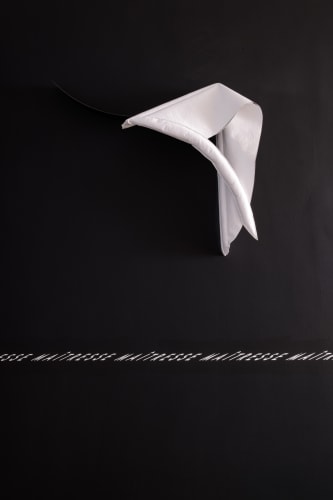The manner in which we dwell is the manner in which we are. Where we live is not an objective, unbiased space; on the contrary, it has been constructed and designed in ways which, either consciously or unconsciously, obey specific biopolitical systems of gender and sexuality. What constructions of the self emerge within contested spaces of inhabitation, and what power relations are established between our bodies and our household objects? In the artist’s first solo show in the Netherlands, Laëtitia Badaut Haussmann transforms Ellen de Bruijne Projects into a space of domestic speculation, of feminist enquiry and emancipation, of cinematic tribute and architectural sublimation.
For Laëtitia Badaut Haussmann, cinema equals architecture, and vice versa. In As if a house…, the artist addresses the connections between female protagonists and domestic architecture in cinema, departing from her interest in two films: Maîtresse by Barbet Schroeder (1976) and Safe by Todd Haynes (1995). In the former, Ariane (Bulle Ogier) lives in a split-level apartment in Paris: on top, an average apartment with stylish Parisian décor; below, a BDSM dungeon where she works as a dominatrix; in the latter, Carol (Julianne Moore), suffering a mysterious illness caused by her surroundings, joins an eerie new-age desert community alongside people with environmental illnesses. Following the artist’s research into domesticity, interior design, and speculative feminist architecture, the gallery space is turned into an installed environment in which to ponder about how domestic space can be perceived as a feminist tool.
Materialities play a very important role in Badaut Haussmann’s installation. From the sensuality and opulence of leather to the crispiness of the hard-edge dark marble, from the coldness of metal to the rugosity and thickness of carpet. All of these – which are references to the abovementioned films – counterbalance each other in a carefully studied environment in which to reflect on the dualisms of isolation and attachment, danger and safety, control and freedom, power and submission, which are altogether intertwined with the question of trust. Upon entry, we are invited in an equally cinematic and architectural experience with an array of sound, sculptural, wall-based, photographic, and filmic works that attempt to disrupt heteronormative space design and conjecture on feminist abodes simultaneously. Contrary to any lofty, grand gesture of scenic design, we are immersed into a kinaesthetic ambience that encourages an engagement with our senses.
Laëtitia Badaut Haussmann (France, 1980) possesses a multi-facetted praxis that stems from intersectional research on domesticity, psychology, and feminism and expertise on film, literature, architecture, and design. She has exhibited, among others, at Centre Pompidou, Musée d’Art Modern de Paris, Palais de Tokyo, MACRO (Rome), Mudam (Luxembourg City), and A Tale of a Tub (Rotterdam), as well as having exhibited in the United States, Japan, and Australia. She currently lives and works in Paris.
Laëtitia Badaut Haussmann | As if a house should be conceived for the pleasure of the eye, she says is a collaboration with Galerie Allen (Paris) and has been made possible with the support of Centre national des arts plastiques (National Centre For Visual Arts), France.


